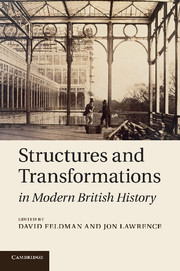Book contents
- Frontmatter
- Contents
- List of figures
- Notes on contributors
- Introduction: structures and transformations in British historiography
- 1 Coping with rapid population growth: how England fared in the century preceding the Great Exhibition of 1851
- 2 The ‘urban renaissance’ and the mob: rethinking civic improvement over the long eighteenth century
- 3 Forms of ‘government growth’, 1780–1830
- 4 Family formations: Anglo India and the familial proto-state
- 5 The commons, enclosure and radical histories
- 6 Engels and the city: the philosophy and practice of urban hypocrisy
- 7 The decline of institutional reform in nineteenth-century Britain
- 8 British women and cultures of internationalism, c.1815–1914
- 9 Psychoanalysis, history and national culture
- 10 Labour and the politics of class, 1900–1940
- 11 The dialectics of liberation: the old left, the new left and the counter-culture
- 12 Why the English like turbans: multicultural politics in British history
- Index
9 - Psychoanalysis, history and national culture
Published online by Cambridge University Press: 04 February 2011
- Frontmatter
- Contents
- List of figures
- Notes on contributors
- Introduction: structures and transformations in British historiography
- 1 Coping with rapid population growth: how England fared in the century preceding the Great Exhibition of 1851
- 2 The ‘urban renaissance’ and the mob: rethinking civic improvement over the long eighteenth century
- 3 Forms of ‘government growth’, 1780–1830
- 4 Family formations: Anglo India and the familial proto-state
- 5 The commons, enclosure and radical histories
- 6 Engels and the city: the philosophy and practice of urban hypocrisy
- 7 The decline of institutional reform in nineteenth-century Britain
- 8 British women and cultures of internationalism, c.1815–1914
- 9 Psychoanalysis, history and national culture
- 10 Labour and the politics of class, 1900–1940
- 11 The dialectics of liberation: the old left, the new left and the counter-culture
- 12 Why the English like turbans: multicultural politics in British history
- Index
Summary
Why have so few historians in twentieth-century Britain engaged with psychoanalytic theories of the mind? More particularly, why have our most celebrated Marxist historians paid so little attention to Freud? In various contexts psychoanalysis and historiography have been pulled together in significant, if necessarily contentious, ways. Leftist politics, historical analysis and Freudian thought have been made to join forces, for better or for worse, in other times and places. In some European countries, noted historians expressed firm reservations about the presuppositions of ‘psycho-history’, but there were nonetheless significant forays into psychoanalytic terrain. But in England, neither the illustrious Communist Party Historians Group (CPHG) nor any other substantial historical movement or ‘school’ was much troubled by Freud's account of the unconscious. While a number of anthropologists, philosophers and art critics sought to challenge or qualify psychoanalytic postulates, historians generally seem to have concluded that the ‘talking cure’ was irrelevant, hardly worth the trouble of detailed critique.
Despite this apparent lacuna, the problems and topics that have been addressed by historians and psychoanalysts in post-war Britain have important affinities. For example ‘images of power’ and ‘the popular mentalities of subordination’, to borrow phrases from E. P. Thompson, preoccupied many historians (Marxist or otherwise) in the later decades of the century. In psychoanalysis, the potentially crippling effects of ‘the superego’ within the psychic and social order had proved ever more central concerns since the 1920s.
Keywords
- Type
- Chapter
- Information
- Structures and Transformations in Modern British History , pp. 210 - 236Publisher: Cambridge University PressPrint publication year: 2011
- 3
- Cited by

